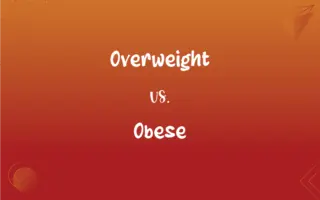Complete vs. Total: What's the Difference?
Edited by Janet White || By Harlon Moss || Published on January 11, 2024
Complete implies that something is whole, finished, or fully accomplished, while total refers to the sum or entirety of something, often in a numerical context.

Key Differences
Complete and total both suggest wholeness but in different contexts. Complete is often used to describe something that is finished or fully made, indicating that nothing is missing. Total, on the other hand, refers to the sum of parts or the entire amount of something, especially quantitatively.
In usage, complete is employed to denote the state of completion or the process of making something whole. For instance, a project is complete when all its parts are finished. Total is used to describe the aggregate amount, like the total cost of items purchased.
Complete can also imply thoroughness or perfection in a non-quantitative sense. A complete understanding means fully grasping a concept. Total, however, is more numerical or quantitative, as in the total number of students in a class.
The word complete is versatile, used in various contexts, from tasks and processes to personal feelings. Total, in contrast, is often associated with figures, such as total earnings or total distance.
Complete can be an adjective, verb, or noun (as in a complete set), while total is primarily an adjective or noun (the total, to total up).
ADVERTISEMENT
Comparison Chart
Primary Use
State of being whole or finished
Sum or entirety of something
Context
Completion, thoroughness, perfection
Quantitative, numerical sum
Example Usage
Completing a task, complete satisfaction
Total cost, total number
Function in a Sentence
Describes the state of something
Describes the sum or aggregate
Grammatical Forms
Adjective, verb, noun
Adjective, noun
ADVERTISEMENT
Complete and Total Definitions
Complete
Finished or fully accomplished.
She completed her degree last year.
Total
Constituting the whole amount.
The total cost was $200.
Complete
Thorough or perfect.
His understanding of the topic is complete.
Total
Entire or absolute.
They faced total defeat.
Complete
To make whole or perfect.
He completed the report yesterday.
Total
Complete in extent or degree.
The project received total support.
Complete
Having all necessary parts.
The puzzle is complete.
Total
Sum of parts.
The total of 5 and 3 is 8.
Complete
Total or absolute.
They enjoyed complete silence.
Total
To calculate the sum of.
She totalled the expenses for the month.
Complete
Having all necessary or normal parts, components, or steps; entire
A complete medical history.
A complete set of dishes.
Total
An amount obtained by addition; a sum.
Complete
(Botany) Having all principal parts, namely, the sepals, petals, stamens, and pistil or pistils. Used of a flower.
Total
The whole amount of something; the entirety
The storm damaged the total of the housing units.
FAQs
Can complete describe a feeling?
Yes, like complete satisfaction or happiness.
Is total always about numbers?
Mostly, but it can also imply totality in a general sense.
How is total used in finance?
It refers to the total amount of money, like total income.
Can complete mean thorough?
Yes, as in a complete analysis or review.
What does complete imply in a task?
Complete means the task is fully finished.
How is total used in mathematics?
Total refers to the sum of numbers or quantities.
Does complete apply to physical objects?
Yes, like a complete set of books.
Does total imply finality?
Often, like the total score or total result.
Is total used in insurance?
Yes, like in total loss or total coverage.
Can total be a verb?
Yes, as in totaling up expenses.
Can complete refer to emotional states?
Yes, like feeling completely overwhelmed.
Is complete used in education?
Yes, like completing a course or degree.
Can complete refer to relationships?
Yes, like a complete partnership.
Is complete used in art?
Yes, like a complete collection or work.
Can total refer to the extent of something?
Yes, as in total darkness or total coverage.
Is complete used in sports?
Yes, like completing a race or game.
How is total used in retail?
It refers to the total price or cost.
Can total describe an outcome?
Yes, like the total effect or impact.
Does complete have a temporal aspect?
It can, like completing something in time.
Does total have a scientific use?
Yes, in calculating total measurements.
About Author
Written by
Harlon MossHarlon is a seasoned quality moderator and accomplished content writer for Difference Wiki. An alumnus of the prestigious University of California, he earned his degree in Computer Science. Leveraging his academic background, Harlon brings a meticulous and informed perspective to his work, ensuring content accuracy and excellence.
Edited by
Janet WhiteJanet White has been an esteemed writer and blogger for Difference Wiki. Holding a Master's degree in Science and Medical Journalism from the prestigious Boston University, she has consistently demonstrated her expertise and passion for her field. When she's not immersed in her work, Janet relishes her time exercising, delving into a good book, and cherishing moments with friends and family.








































































